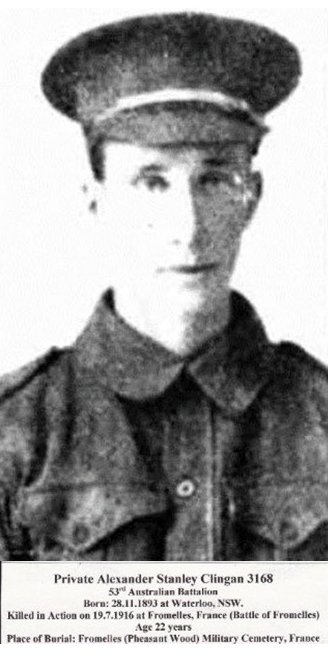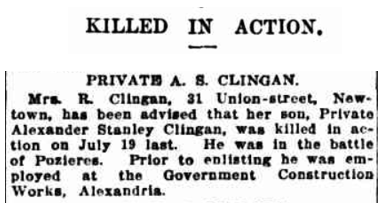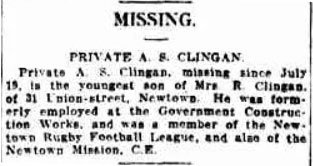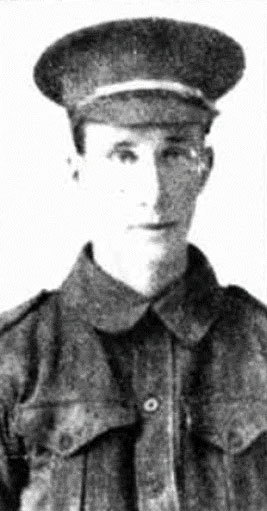
1893-1916
Alexander Stanley CLINGAN
Eyes blue, Hair fair, Complexion fair
Alick – sportsman, loving son, ironworker
Alick, born in 1893, had attended Newtown Superior Public School and was a promising sportsman in cricket and football. As a 21-year-old, he played 2nd grade rugby league football and had the highest individual score in Junior grade cricket in 1915 at Moore Park in Sydney. He was also working as a boilermaker’s labourer or ironworker’s assistant for the NSW Railways.
He was the youngest surviving child of William Clingan and Ruth Langdon. William and Ruth had married in 1880 at the Congregational Church in Waterloo, Sydney before moving to Joadja Creek near Mittagong. William worked as a furnace man at the shale mines. Joadja Creek had a large Scottish mining population and William himself was born in Glasgow but had emigrated with his parents as an infant in 1854. He died in Newtown in 1907 aged 55.
Ruth was born in New South Wales to English emigrant parents. She and William had a family of seven - two daughters and five sons, the youngest of whom died as an infant. The family were Methodist and Ruth taught classes in the City Mission Hall at Newtown and was later involved with the Church Aid in Campsie.
When Alick, then the youngest of her brood, enlisted, it must have been a heart-wrenching time for Ruth saying goodbye to her youngest child, not knowing if she would ever see him again. Alick, though, was a faithful correspondent and he wrote home regularly to his widowed mother – twenty-two beautifully written letters over just nine months, always signed, “Your affectionate son, Alex.” Ruth treasured those letters until she died in 1936 and they remain much valued family keepsakes to this day. Two of those letters are transcribed below.
Alick’s War
In August 1915, Alick answered the call to serve his country and enlisted in the AIF. Shortly thereafter he embarked for Egypt and later for France. He was reported as missing in action on 19 July 1916, less than a year after joining the AIF.
His name appeared on the German Death List and in March 1917 his identity disc was returned by the Germans. In late March 1917, Ruth was advised as next of kin that Private Alexander Clingan had been killed in action.
Official notifications as to Alick’s fate were brief and to the point. The telegram dated 30 August 1916 to Mrs R Clingan, 31 Union Street Newtown stated:
‘Regret to inform you that No.3168 Pte Clingan 53rd Battalion is officially reported missing 19 July. Should particulars be received you will be informed immediately.’
While the telegram dated 2nd April 1917 to Rev. Dinning, Alice Street, Newtown stated:
‘Officially report that number 3168 Pte AS Clingan 53rd Battalion previously reported missing now reported killed in action 19th July. Please inform mother Mrs R Clingan 31 Union Street Newtown and convey deep regret and sympathy of their Majesties the King and Queen and Commonwealth Government in sad loss that she and Army have sustained by death of soldier.’
Information from the Red Cross was slightly more detailed but it was clear that no one was sure of the full circumstances of his death. The letter from the Australian Red Cross Society to Ruth dated 10 March 1917 said:
‘Dear Madam,
It is with the greatest regret that we have to inform you that our Agents in London have written to us to say that the above soldier’s name appears in the German Death List issued on 4th November 1916. Our agents inform us that these lists are really made out from the discs which have been gathered by the Germans from men who have been found killed or who have died from wounds, or who have died as Prisoners of War in Germany. Our agents also tell us that according to their instructions, the Germans have buried the men after obtaining their discs. We are afraid, therefore, that there can be little doubt but that the above soldier must have died and we would ask you to accept from all of us our sincerest sympathy in your great sorrow.’
Ruth herself wrote in 1921:
'I have never received definite information as to whether my son was missing after Fromelles or Fleurbaix. The military informed me that he was missing July 19th, 1916. His mates have told me that they saw him go over on that date but did not see him again.
……but whether the death was due to wounds or otherwise I do not know.
Ruth, never knew the details of her son’s fate and was said to have gone to the waterfront to meet every troopship returning to Sydney, hoping against hope to see her beloved son again. We can but imagine her sadness, pain of loss and disappointment, day after day.
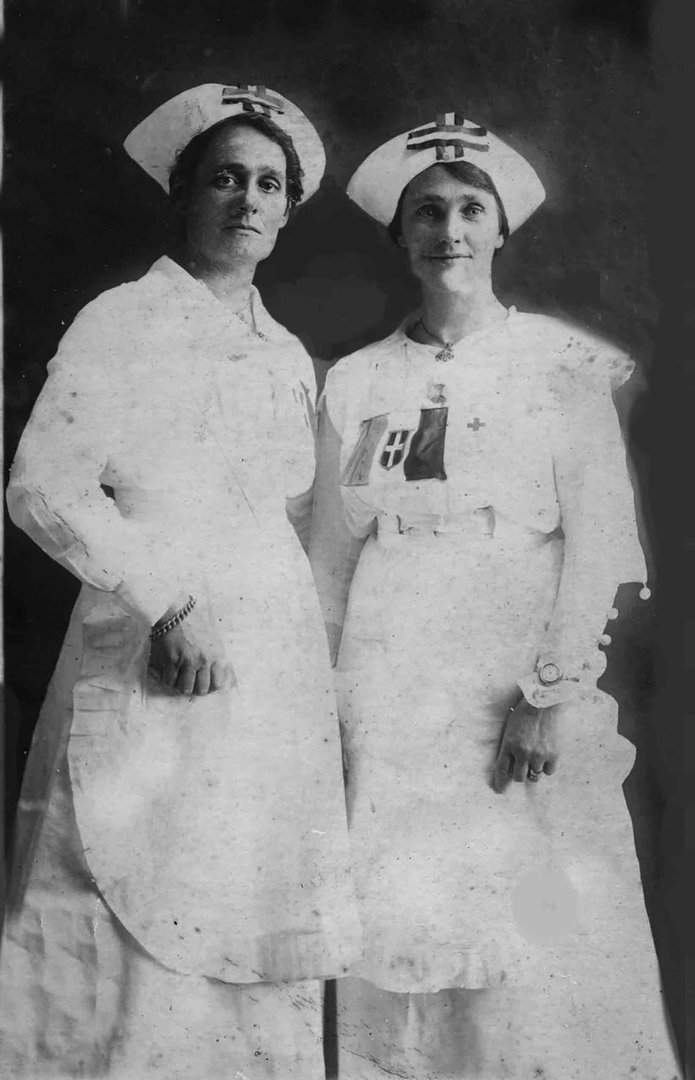
In later years, family members also recall Alick’s sister, Ethel McDonald (nee Clingan) and her daughter, Thelma telling stories about Alick. Ethel was very proud of her brother and his achievements in life, including his sporting prowess. She would reminisce about him going to school at Newtown and playing football with the Newtown Bluebags. A number of his footballing team mates also enlisted including Herbert (Nutsy) Bolt, who not only went to school at Newtown and played for the Bluebags but was also killed at Fromelles.
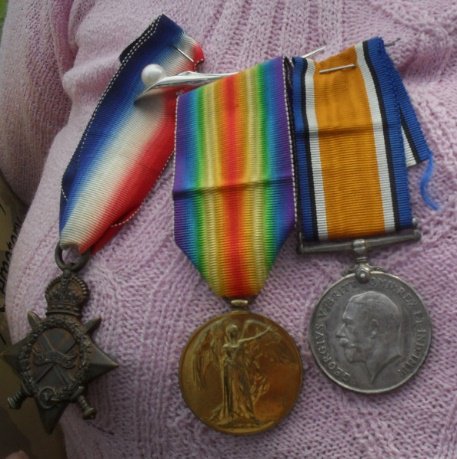
News – but nearly a century later
In 2010, news had spread of the Army’s request for the DNA of family members who believed their loved ones had died at Fromelles, France. Four members of the extended family, two from the male line and two from the female line were sent DNA kits.
On 16 March 2010, they received phone calls from the Army to tell them the wonderful news that the family’s DNA was a positive match with the DNA taken from the remains of Alexander Stanley Clingan. Alick was one of the first Australian soldiers to be positively identified. The joy amongst the immediate and extended family had to be seen to be believed - Alexander, lost for almost a century, had now been found!
The Fromelles Ceremony 2010
Nine members of the family attended the Commemorative Ceremony of the new Pheasant Wood Military Cemetery at Fromelles on 19 July 2010, exactly 94 years to the day the Battle of Fromelles took place. It was the first cemetery built by the Commonwealth War Graves Commission in 50 years.
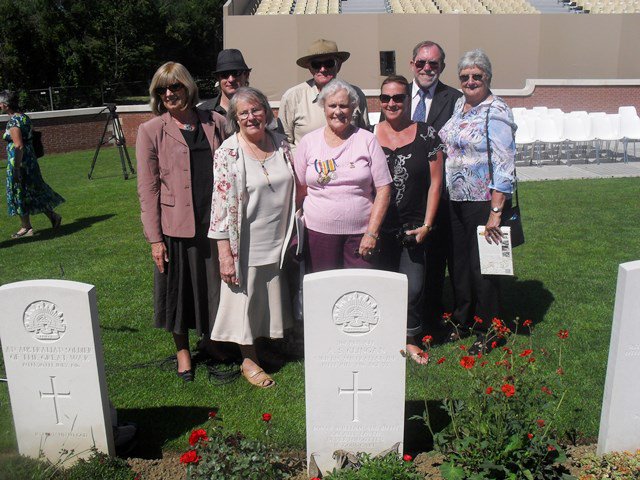
Ethel’s great-grandson, Peter, came with his mother, Gwenda, to represent his father, grandmother and great-grandmother. It was an emotional, yet wonderful day and Gwenda, recalls, “I remember Alexander’s face being projected onto the large screen as we waited for the Ceremony to begin. One of our family members, Margaret (Clingan) Wright OAM, spoke some wonderful words about Alexander as we watched on proudly.”
Gwenda also recalled her excitement a few days earlier in London when she had unexpectedly spotted Alexander’s picture as part of a Fromelles exhibition at the Imperial War Museum. She just had to snap a picture of her son Peter beside Alexander’s photo!
At Fromelles, the Duke of Kent opened the ceremony and dignitaries included Prince Charles, Camilla the Duchess of Cornwall, our Australian Governor General, Quentin Bryce, and members of the French, British and Australian Army.
Soon, participants could hear the clippety clop of horses’ hooves along the road outside the cemetery. On the screens, everyone could see a horse-drawn First World War wagon arriving with the coffin of an unknown soldier. Six Australian Army soldiers carried in the coffin of the last soldier who was to be buried during the ceremony.
After the formal dedication and tributes were completed and the French, British and Australian national anthems were sung, the burial service took place. The firing party fired three volleys and the trumpeter played the Last Post, followed by a one-minute silence and then Reveille. A WW1 aircraft flew overhead and then dignitaries laid wreaths at the Cross of Sacrifice Memorial. The words spoken by Governor General Quentin Bryce during the service truly touched the hearts of all:
“Twenty-five sets of brothers, two sets of father and son.
All of them, loved ones.
Allied by Kingship.
Born of blood and Empire.
United at the front line by a common humanity.
Fine, willing, courageous men.
Two hundred and fifty of them.
Lost and now found. “
At the end of the Commemorative Ceremony, the dignitaries departed as gardeners who worked on the cemetery formed a Guard of Honour and the Minden Band of the Queen’s Division of the British Army played a medley of First World War tunes.
During the afternoon, Prince Charles, his wife, Camilla, and Quentin Bryce, met with two members of each of the families of the soldiers. Joan Hampson (nee Stockton) and Robyn Hanna represented the Clingan family at this informal gathering.
At three o’clock, family members were seated near the graves of their loved ones in the cemetery. We were addressed by Army personnel and the Governor General, Quentin Bryce. She spoke with such feeling and identified with us and our deep emotions, both of sadness and joy, as we gathered together around the graves of our loved ones.
Then the moment came when families were able to go to their soldier’s graveside. What a moment that was. Each family of an identified soldier was given the opportunity to have their own service with an Army chaplain at the graveside. At our service for Alexander, we discovered that the Army chaplain conducting the service had also been the chaplain at Alexander’s burial and she spoke as if she knew Alexander personally. She had clearly been touched by his story. During his burial service, she had read the 23rd Psalm and so she said that she would like to read it with us together as a family. She read other scriptures and prayed and said the blessing. It was a very moving and emotional time.
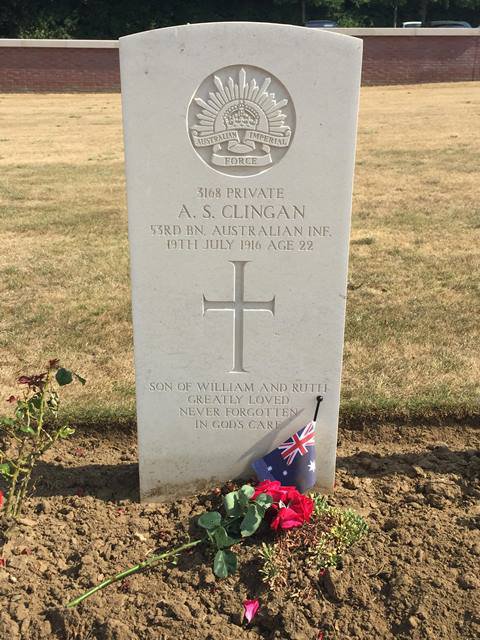
As family member, Robyn Hanna, later said:
The ceremony provided some closure on a sad episode for our family. It was just an amazing day and most brilliantly done. We all cried all day, but we also felt like he finally had a home – that he had somewhere at last.
Another cousin, Colonel Scott Clingan who was in the Australian Army based in France once said, “Everyone who served and died deserves to be remembered.”
And so, he is remembered - Alexander Stanley Clingan, greatly loved and never forgotten. In God’s care.
Two of the Letters from Alexander to his Mother – Egypt & France 1915-1916
Sunday 2nd July 1916
France
Dear Mother,
Just a line to let you know I’m OK and still kicking. We disembarked at Marseilles on Wednesday morning after 6 days journey on the boat with calm seas all the way. We started on our train journey across France at 8.00 in the morning and arrived at our destination in Friday afternoon about ½ past 5 taking 2½ days and 2 nights to do the trip. The journey never was monotonous, the country being a sight, crops in every yard of the country and up steep hillsides of vineyards. Fruit trees, vegetables, wheat etc. with any amount of Poppies and other kind of flowers growing all over the place in the fields and along the railway lines. When passing the Railway Stations and Engine yards you see women working in the tracks and some clearing engines and any amount working in the fields. We are billeted in barns and sheds in a large village within hearing of the heavy guns in the firing line. The barns hold about 30 of us and at the back is a fair sized paddock. Yesterday evening a football was brought up and it wasn’t long before sides were picked and they were tearing into us for all they were worth. It gets dark here about 9.30:10 o’clock.
Last night we saw plenty of aeroplanes going up having a look at the enemy lines with shells bursting behind in front under and over, but a devil a one could they hit. About 8.30 in the night a heavy firing started and lasted well into the early hours of the morning, it reminded us that there was a war on and not very far away either.
The weather has been nice since we have been here with a nice warm sun, but later on we will get cold, but we are well fitted out with warm underclothes so I do not think it will trouble us much. It’s a cheap place for a drinker over here, a glass costs one 1d. So now I will close as this is all the news at present. With best love to you and all at home and hoping that you are well.
With best love,
From your Affectionate Son,
Alex.
P.S. Fred sends kind regards and wishes to be remembered to you. Remember me to the Warwick’s and tell Jack I’ll write after. Have not been able to post letters lately and have not received any through being shifted about so much. Tell Arthur to hurry up or I’ll beat him.
Oui the young ladies over here are nice.
Address letters to France instead of Egypt.
This letter was written on an embroidered Letter Card with the words
12th July 1916 France
Dear Mother,
Just a line to let you know I’m OK. We have shifted again nearer the firing. First we shifted to about 8 miles from the firing line to a billet where we stopped for 2 days until now. We have moved into another billet only a mile or so from the firing line. We are in houses in a village which presents a very dilapidated appearance, only a few have windows intact and many have holes in the roof, slates off, etc. We moved into this place late at night with guns going off and flares lighting up the trenches in front. We arrived alright, no-one being hurt. Along the road we passed one of our big guns. They were putting it into the square heads. You could see the flash and feel the concussion.
Your affectionate Son, Alex
The Fromelles Association would love to hear from you

Contacts
(Contact: royce@fromelles.info or geoffrey@fromelles.info).
(Contact: army.uwc@defence.gov.au or phone 1800 019 090).
Donations
If you are able, please contribute to the upkeep of this resource.
(Contact: bill@fromelles.info ).
